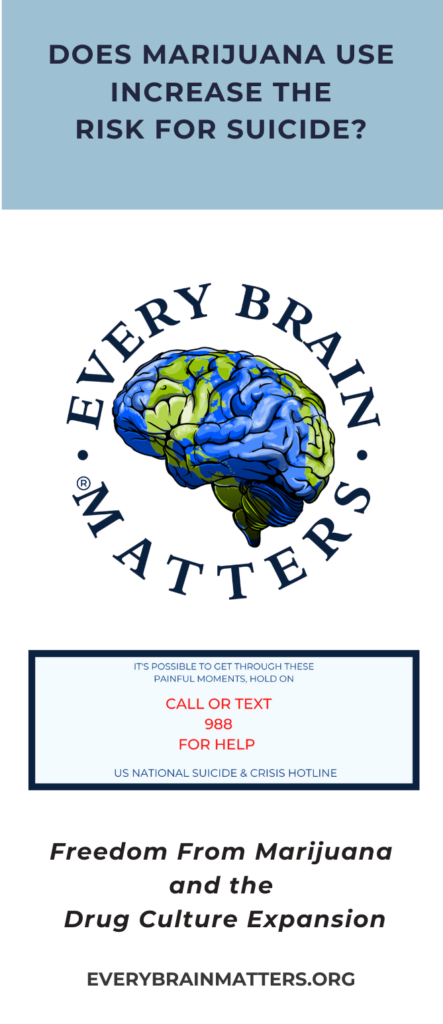Posted on July 22, 2022 View all news
Does marijuana use lead to suicidal tendencies in some adolescents?
Yes. Two independent studies came up with a very similar elevation in risk (nearly 7-fold increase):
https://www.thelancet.com/journals/lanpsy/article/PIIS2215-0366(14)70307-4/fulltext https://www.ncbi.nlm.nih.gov/pmc/articles/PMC4219077/pdf/wps0013-0322.pdf
Are there associations between cannabis use and suicidality trends in young adults?
Yes, this 2021 study from JAMA concluded: From 2008 to 2019, suicidal ideation, plan, and attempt increased 40% to 60% over increases ascribed to cannabis use and MDE (major depressive episode). Past-year CUD (cannabis use disorder), daily cannabis use, and non-daily cannabis use were associated with a higher prevalence of suicidal ideation, plan, and attempt more significantly in women than in men. Because the prevalence of CUD increases with time since initiation of use among young adults (18 to 34 years old), the results of the paper underscore an urgent need for prevention interventions designed specifically for young people before first cannabis exposure and highlight the importance of early screening for daily cannabis use and CUD, as well as, CUD treatment, especially among young women. https://jamanetwork.com/journals/jamanetworkopen/fullarticle/2781215
Does marijuana trigger mental illness or does mental illness trigger marijuana use?
Part of the risk for suicide may be exerted through the mental disorders that marijuana triggers (as referenced previously), particularly psychotic disorders and depression: https://www.ncbi.nlm.nih.gov/pmc/articles/PMC4197787/pdf/cjp-2014- vol59-october-531-538.pdf However, there is also evidence that marijuana’s effect can be more immediate from a recent study illustrating the likelihood of suicidal thoughts increased on the days when an adolescent uses marijuana: https://www.sciencedirect.com/science/article/abs/pii/S0165178118323321?via%3Dihub
Does marijuana increase or decrease the probability of self-harm?
Yes, cannabis use increases the risk of self-harm in youths with mood disorders. JAMA Pediatrics concluded: Cannabis use disorder is a common comorbidity and risk marker for self-harm, all-cause mortality, and death by unintentional overdose and homicide among youths with mood disorders. These findings should be considered as states contemplate legalizing medical and recreational marijuana, both of which are associated with increased CUD. https://jamanetwork.com/journals/jamapediatrics/fullarticle/2775255
On June 22, 2021, A JAMA analysis of survey data from more than 280,000 young adults ages 18-35 showed that cannabis (marijuana) use was associated with increased risks of thoughts of suicide (suicidal ideation), suicide plan, and suicide attempt. These associations remained regardless of whether someone was also experiencing depression. With vs without CUD (Cannabis Use Disorder) was 13.9% vs 3.5%.
In Colorado, the THC-positive toxicology screens in youth aged 14-18 have consistently increased over the past several years, with marijuana being the leading drug found in suicide victims of that age range.
1. Circumstances, Toxicology, and Injury location 2. Select the year slide from 2014 to present 3. Age (drop box): check only 10-14 and/or 15-1


Is there any evidence that cannabis use is a causal risk for suicide?
Christine L. Miller, Ph.D. applied the Bradford Hill Criteria for Causation Relationship Between Marijuana Use and Suicidal Behavior, September 2020 and concluded: All but one (#4) of the seven relevant Bradford Hill criteria have been satisfied for the causal connection between marijuana use and the development of suicidal behavior. The evidence that an “appropriate temporal sequence” exists (outlined in criterion #4) is strongly suggestive though remains unconfirmed from an academic standpoint. Further study is required in the form of longitudinal studies that are prospective in nature. Adequate length of follow-up time and number of assessment intervals, ability to adjust effectively for poly-substance use with respect to timing of use, distinguishing acute from chronic effects, addressing ethnic diversity with respect to outcome and ensuring adequate statistical power should be incorporated in future research paradigms. Nevertheless, the weight of the evidence currently available should be regarded as strong enough to elicit widespread public health warnings about the suspected role of marijuana use in precipitating suicidal behaviors, since the mandate of the relevant authorities is to err on the side of protecting public health rather than to establish scientific certainty beyond a shadow of a doubt. This is particularly urgent in view of the continuing increase completed suicides in conjunction with rising marijuana use rates and more potent products, not only in specific states but across the nation as a whole (Miller et al., 2020).
https://everybrainmatters.org/wp-content/uploads/Causation-Relationshop-Between-Marijuana-annd-Suicidal-Behavior-Christine-L.-Miller-Sept.-2020.pdf
Share our pamphlet to help raise awareness of marijuana’s link to suicide.


